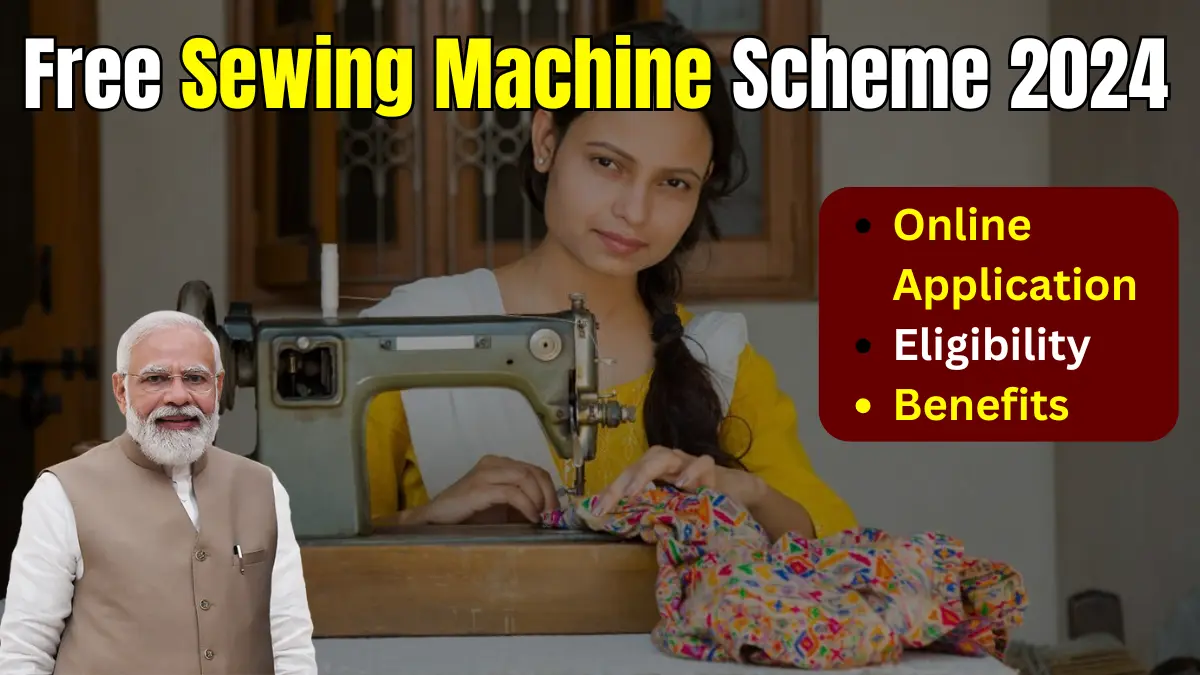The Free Sewing Machine Scheme 2024 is a significant initiative introduced by Prime Minister Narendra Modi to uplift women by providing them with free sewing machines. This scheme targets women from weaker sections of society, helping them become financially independent through self-employment. It particularly benefits women who face challenges in working outside their homes due to family responsibilities or societal norms.
Key Objectives of the Scheme
The primary objective of the Free Sewing Machine Yojana is to empower women by offering them tools for income generation. By supplying free sewing machines, the government enables women to develop their tailoring and stitching skills. This not only allows them to start home-based businesses but also increases their household income, which can be used for better healthcare, education, and nutrition. The scheme promotes self-sufficiency and financial autonomy, offering women the chance to improve their socio-economic status.
| Feature | Details |
|---|---|
| Scheme Name | Free Stitching (Sewing) Machine Yojana 2024 |
| Launched By | Prime Minister Narendra Modi |
| Governing Body | Ministry of Women and Child Development |
| Primary Objective | Empowering women by providing free sewing machines |
| Mode of Application | Online |
| Beneficiaries | Women from weaker sections of society |
| Eligibility Age | 20 to 40 years |
| Year of Launch | 2024 |
| Targeted States | All states in India |
| Special Priority | Widows, disabled women, and women from SC/ST/OBC categories |
| Official Website | pmvishwakarma.gov.in |
| Application Deadline | Not yet specified |
| Required Documents | Aadhar Card, Income Certificate, Residence Proof, etc. |
| Main Benefits | Promotes self-employment, financial independence, and home-based work |
Benefits of the Free Sewing Machine Yojana
- Economic Empowerment: The sewing machine acts as a means for women to earn their own income by taking up stitching or tailoring assignments, either individually or in collaboration with local garment businesses.
- Skill Development: By learning sewing and tailoring skills, women gain expertise in an important craft, which increases their chances of securing jobs in the growing textile and garment industry.
- Self-Employment: This scheme encourages home-based work, making it especially advantageous for women who cannot leave their homes due to familial obligations or societal restrictions.
- Support for Vulnerable Groups: Special priority is given to widows, disabled women, and those from Scheduled Castes (SC), Scheduled Tribes (ST), and Other Backward Classes (OBC), ensuring that women from disadvantaged backgrounds have better access to opportunities.
Eligibility Criteria
To apply for the Free Sewing Machine Scheme, applicants must meet the following requirements:
- Age Limit: Women must be between 20 and 40 years old.
- Low-Income Group: The scheme is specifically for women from weaker sections of society.
- Residency: Applicants must be Indian citizens and should not have any family members working in government jobs.
- Priority Groups: Disabled women, widows, and those belonging to SC, ST, or OBC categories are given preference.
Documents Required
Applicants will need the following documents to complete the application:
- Aadhar Card
- Residence Proof
- Income Certificate
- Widow Certificate (if applicable)
- Disability Certificate (if applicable)
- Passport-size Photo
- Phone Number and Email Address
How to Apply for Free Sewing Machine
Women interested in applying for the Free Sewing
- Visit the official website at pmvishwakarma.gov.in.
- Click on the “Apply Now” button.
- Enter your mobile number and the captcha code for verification.
- Fill in the application form with your personal details and upload the necessary documents.
- Submit the form after rechecking all the information.
Conclusion
The Free Sewing Machine Yojana 2024 is a crucial step towards empowering women by offering them the tools they need to achieve financial independence. By providing access to free sewing machines, the government is helping women overcome economic challenges, support their families, and contribute to the textile industry. This initiative not only promotes gender equality but also paves the way for women to gain self-reliance and improve their overall quality of life.
